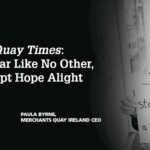Women in homelessness facing complex challenges, and need the right supports – Merchants Quay Ireland
The webinar, Responding to the Complex Needs of Women who use Substances- Women and the Homeless Crisis can be accessed HERE.
A copy of the report is available here: Responding to Women with Complex Needs Who Use Substances: A briefing paper.
New report says it is time for Ireland to really respond to women with complex needs, and ensure that they have access to safe, risk free spaces.
A new report, published today at a special webinar organised by Merchants Quay Ireland (MQI), the leading homelessness and addiction charity, has highlighted the specific complex needs faced by women in addiction and homelessness and has called for an increase in the number of Gender Specific Harm Reduction & Treatment Services available in Ireland.
The report, conducted in partnership with the UCD Community Drugs Programme, shows that;
- 42% of people in homelessness are female;
- The average age at death of women who are homeless in Ireland is 38 years, while for men it was 44;
- In 2017 there were 211 female drug related deaths – a 7% increase on 2016;
- Women who experience extensive violence and abuse are 8 times more likely to be drug dependent;
- 1/3 of the 271 million people who use drugs globally are female.
Today’s webinar heard calls for provision of appropriate services and accommodation for women with appropriate associated supports, a more multi-disciplinary approach to addressing the complex needs of vulnerable women experiencing homelessness and addiction and greater education and training.
Commenting on the report, MQI Chief Executive Paula Byrne said:
In responding to the challenges facing women today accessing services, it is imperative that we provide gender responsive and trauma informed services to meet the needs of women and are accessible to all in need – women with drug problems, pregnant and parenting women, women involved in sex work, women from ethnic minorities, who may have been trafficked and women in prison. Services need to comprehensive in order to address the multiple issues that face women.
We need to secure long term funding for a Women’s Centre which would provide a ‘one stop shop’ for access to information and support across health, addiction, violence and abuse, legal issues, education, and employment support, counselling, health services etc. Studies have found that such spaces increase feelings of safety, respect and dignity among women who use drugs and who have experienced abuse.
Providing safe and stable housing for women as they exit treatment or interventions is also key. Investment in appropriate education, training skills development to ensure staff have the competencies to encourage women to use drugs to access or engage with services and to intervene for them effectively.
Dr. Sarah Morton, lead author of the briefing paper said:
In Ireland, we are starting to get a real understanding of the complex issues some women face, including problematic substance use, intimate partner abuse, homelessness and compromised mothering. We have seen recently how this can result in tragic outcomes for women and for their children. Many services are committed to supporting women, but this can be very challenging if the first thing we can’t do is provide her with a safe, risk free environment to talk to us.
We know that building trust is so important, and women dealing with complex issues need to know they can access safe spaces where they can start to build trust with service providers. Only then will we see significant improvements in outcomes for women dealing with multiple issues.
-ENDS-
Note to the editor:
The webinar, Responding to the Complex Needs of Women who use Substances- Women and the Homeless Crisis can be accessed HERE.
A copy of the report is available here: Responding to Women with Complex Needs Who Use Substances: A briefing paper.
The speakers at the webinar are:
Dr Sarah Morton
Dr Sarah Morton is Director of the Community Drugs Programme, School of Social Policy, Social Work and Social Justice at University College Dublin. Her research interests are drug policy, gender, domestic violence and trauma. Dr Morton has a particular interest in innovative research methodologies and social and organisational change.
Sam Shirley-Beavan
Sam Shirley-Beavan is a social science researcher in the Public Health & Social Policy team at Harm Reduction International. He conducts original research and analysis into harm reduction trends around the world. Prior to joining Harm Reduction International, he worked at the International AIDS Society and human rights organisations in Europe and Latin America.
Aura Roig Forteza
Aura Roig Forteza is a social anthropologist and has a Master’s Degree on Criminology and Sociology of the Penal System of the University of Barcelona. For the past 18 years she has been dedicated to drug policy, harm reduction, human rights and gender mainstream, combining research with the design, implementation, monitoring and evaluation of drug policies, programs and services in Spain, Canada, Colombia and Costa Rica. Three years ago she moved back to Barcelona to do the first study about women who inject drugs in Catalonia, that was the beginning of the XADUD, Network of Women who Use Drugs. Two years ago, started Metzineres. Environments of Shelter for Women Who Use Drugs Surviving Violences , first harm reduction program only for women in Spain, where she is the founding director of first harm reduction program only for women in Spain, where she is the founding director.
For more information contact:
Laura McDowell
Communications Co-Ordinator
Merchants Quay Ireland
M: 086 779 3206
Email laura.mcdowell@mqi.ie
Website: www.mqi.ie
Facebook: www.facebook.com/MerchantsQuayIR
Twitter: @MerchantsQuayIR

